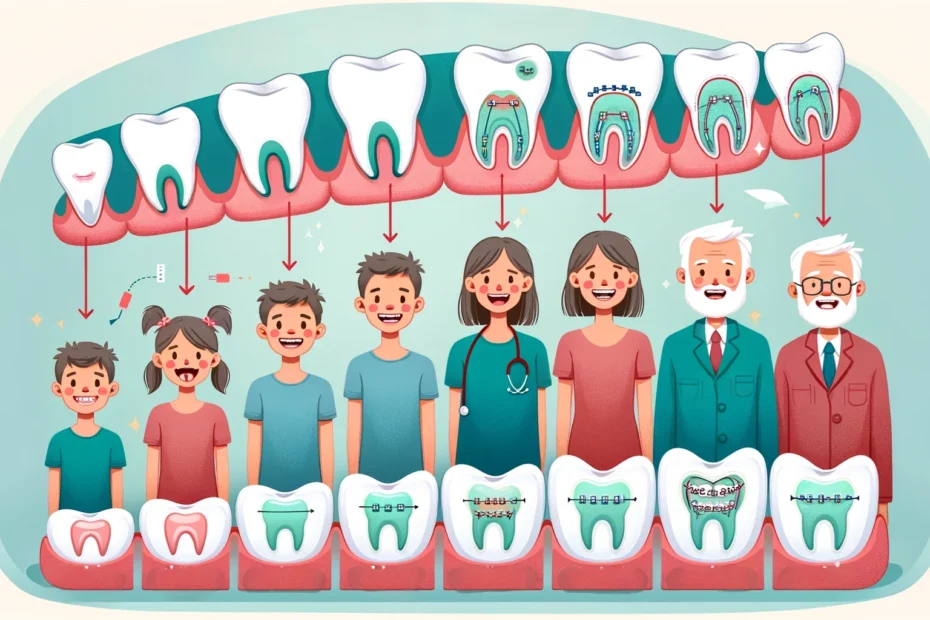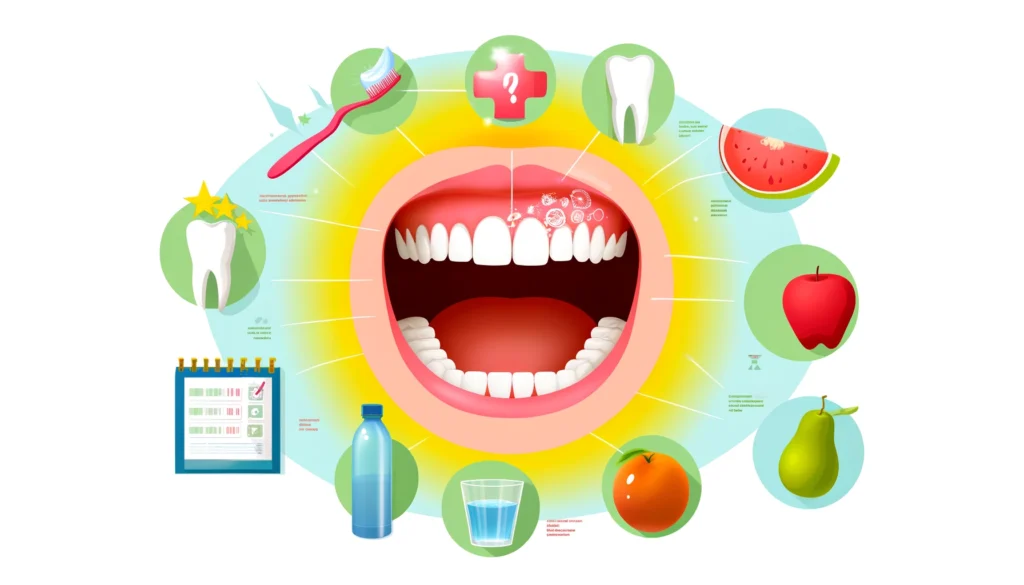Oral health is integral to overall well-being, transcending age and affecting individuals at every stage of life. The relationship between age and oral health is multifaceted, influenced by physiological changes, lifestyle factors, and preventive care practices.
This article delves into the nuanced relationship between age and oral health, exploring how dental health evolves from childhood through the senior years and highlighting strategies for maintaining optimal oral health across the lifespan.
Oral Health in Childhood
The foundation of oral health is laid in childhood, marked by rapid growth and development. Although temporary, primary (baby) teeth play a crucial role in proper chewing, speech development, and maintaining space for permanent teeth.
Early childhood caries (ECC) is a common concern, often resulting from prolonged exposure to sugary substances.
Parents and caregivers must emphasize the importance of good oral hygiene practices, such as brushing with fluoride toothpaste and regular dental visits, to prevent decay and establish lifelong healthy habits. Neglecting teeth brushing in childhood can lead to serious dental health issues, significantly impacting oral and overall health.
Establishing proper oral hygiene routines during this stage is paramount.
Brushing should begin as soon as the first tooth erupts, usually around six months of age. Parents should gently brush the infant’s teeth twice a day using a smear of fluoride toothpaste. As children grow and develop fine motor skills, they can gradually take on more responsibility for their oral hygiene. However, supervision and assistance should continue until they can effectively brush and floss independently, typically around six to eight.
The diet also plays a significant role in childhood oral health.
Limiting sugary snacks and beverages and encouraging a balanced diet of fruits, vegetables, and whole grains can help prevent tooth decay. Introducing healthy eating habits early sets the stage for a lifetime of good dietary choices that support oral health.
Regular dental visits should start by the child’s first birthday or within six months of the first tooth’s appearance.
These visits allow for professional cleaning and examination and for parents to receive guidance on proper oral care and dietary practices. Pediatric dentists can apply sealants to molars to prevent decay and recommend fluoride treatments to strengthen tooth enamel.
Furthermore, educating children about the importance of oral health in a fun and engaging way can foster positive attitudes towards dental care. Using colorful, child-friendly toothbrushes and toothpaste, along with storybooks and videos about oral hygiene, can make brushing and flossing more enjoyable for young children.
Adolescent Oral Health Concerns
Adolescence brings its own set of oral health challenges. Hormonal changes during puberty can increase the risk of gingivitis, an inflammation of the gums. Additionally, the advent of orthodontic treatments, such as braces, necessitates meticulous oral care to prevent plaque buildup and cavities.
Teenagers are also more prone to engaging in behaviors detrimental to oral health, including tobacco use, poor dietary choices, and oral piercings. Education on the consequences of these behaviors and the importance of maintaining good oral hygiene is crucial during this stage.
The hormonal fluctuations that accompany puberty can cause the gums to become more sensitive and prone to inflammation.
This makes adolescents more susceptible to gingivitis, which, if left untreated, can progress to more severe forms of periodontal disease. Regular brushing, flossing, and routine dental check-ups are essential to manage and prevent gum disease.
Orthodontic appliances, while beneficial for correcting misaligned teeth and bite issues, can create additional challenges for maintaining oral hygiene.
Braces and other orthodontic devices can trap food particles, making it harder to clean the teeth thoroughly. Adolescents with braces should be diligent about brushing and flossing, using specialized tools such as interdental brushes and water flossers to clean around brackets and wires. Orthodontists often provide specific instructions and demonstrations on how to care for teeth during treatment.
Teenagers are at a critical age where they begin to make independent choices about their health and lifestyle.
The appeal of sugary snacks, energy drinks, and fast food can lead to an increased risk of cavities. Moreover, experimentation with tobacco products, including vaping, poses significant oral health risks, such as stained teeth, bad breath, and an increased risk of oral cancer. Oral piercings, popular among some teens, can also cause complications, including infections, chipped teeth, and gum damage.
Education and communication are key to promoting good oral health during adolescence. Parents, educators, and healthcare providers should emphasize the long-term benefits of maintaining oral hygiene and the potential consequences of neglecting it.
Oral Health in Older Adults
As individuals age, maintaining oral health can become increasingly challenging. Older adults may experience various dental issues, including dry mouth (xerostomia), root caries, and oral cancer. Medications for chronic conditions can often have side effects that impact oral health. Additionally, cognitive decline and physical limitations can hinder effective oral hygiene practices. Older adults must have access to dental care and support to manage these issues, ensuring their oral health does not deteriorate and affect their overall quality of life.
Strategies for Maintaining Oral Health Across the Lifespan
Maintaining optimal oral health requires targeted strategies at every stage of life to address age-specific challenges and promote lifelong dental well-being.
Children:
Establishing good oral hygiene practices early is essential for lifelong dental health.
- Parental Involvement: Parents should supervise and assist with brushing and flossing until children can do it effectively independently.
- Early Dental Visits: Schedule the first dental visit by the child’s first birthday and continue with regular check-ups.
- Healthy Diet: Encourage a diet low in sugary snacks and beverages and rich in fruits, vegetables, and whole grains.
- Oral Hygiene Education: Use fun, engaging methods to teach children the importance of brushing and flossing.
Adolescents:
Reinforcing healthy behaviors during adolescence can prevent long-term oral health issues.
- Reinforcement of Healthy Behaviors: Educate teenagers about the consequences of poor oral hygiene and the importance of regular brushing and flossing.
- Orthodontic Care: Guide on maintaining oral hygiene with braces or other orthodontic appliances.
- Healthy Lifestyle Choices: Encourage avoidance of tobacco products, limiting sugary foods and drinks, and making smart dietary choices.
- Regular Dental Check-ups: Continue with regular dental visits for professional cleanings and examinations.
Adults:
Prioritizing dental care and addressing lifestyle factors are crucial for maintaining oral health in adulthood.
- Prioritize Dental Visits: Schedule regular dental check-ups and cleanings to prevent and treat issues early.
- Address Lifestyle Factors: Be mindful of diet, smoking, and alcohol consumption, all of which can impact oral health.
- Consistent Oral Hygiene Routine: Maintain a routine of brushing twice daily with fluoride toothpaste and flossing daily.
- Stress Management: Manage stress to prevent issues like teeth grinding (bruxism), which can damage teeth.
Older Adults:
Comprehensive dental care accommodating physical and cognitive limitations ensures continued oral health in older age.
- Comprehensive Dental Care: Ensure access to dental care that addresses the specific needs of older adults, including managing dry mouth, root caries, and oral cancer screenings.
- Accommodate Limitations: Provide support for physical and cognitive limitations that may affect the ability to maintain oral hygiene.
- Medication Management: Be aware of medications’ side effects that can impact oral health and work with healthcare providers to mitigate these effects.
- Regular Check-ups: Continue with regular dental visits to monitor and treat age-related oral health issues.
Across All Ages:
- Balanced Diet: Maintain a healthy diet that supports oral health, focusing on nutrient-rich foods and limiting sugar intake.
- Proper Oral Hygiene: Brush twice daily with fluoride toothpaste and floss daily to prevent plaque buildup and cavities.
- Avoid Harmful Habits: Refrain from smoking and excessive consumption of sugary foods and drinks.
- Stay Hydrated: Drink plenty of water to help rinse away food particles and reduce the risk of dry mouth.
| Age Group | Health Concern | Solution |
| Children | Early Childhood Caries (ECC) | Parental supervision, fluoride toothpaste, healthy diet, early dental visits |
| Adolescents | Gingivitis, Orthodontic Care, Risky Behaviors | Education on oral hygiene, guidance on braces care, avoiding tobacco and sugary foods |
| Adults | Periodontal Disease, Lifestyle Factors | Regular dental check-ups, consistent oral hygiene, address diet and smoking |
| Older Adults | Dry Mouth, Root Caries, Oral Cancer | Comprehensive dental care, support for limitations, medication management, regular check-ups |
| All Ages | General Oral Health Maintenance | A balanced diet, proper oral hygiene, avoiding harmful habits, staying hydrated |
Conclusion
In conclusion, the relationship between age and oral health is dynamic and complex, necessitating targeted interventions and continuous care. By understanding the specific needs and challenges at each stage of life, individuals can take proactive steps to maintain their oral health and overall well-being.

Dr. Orion Johnson is a dedicated and compassionate dentist committed to providing exceptional dental care to his patients.Dr. Johnson obtained his Doctor of Dental Surgery (DDS) degree from a prestigious dental school, where he excelled academically and clinically. He is licensed to practice dentistry and stays updated with the technology through continuing education and training.

